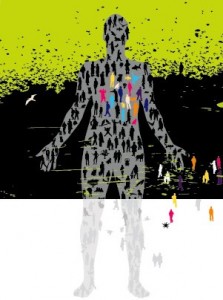Equity Ambassadors have been busy this month, collaborating with the Wellness Peers on “Rapid HIV tests” that took place in Marine Drive and in Brock Hall. As well, our weekly Tuesday meeting have been busy with workshops from Out in Schools and YouthCO. And in between all this, we have been planning three workshops for the Student Leadership Conference in January. I have been spearheading in designing a new “Accents” workshop for SLC and that is what I’d like to elaborate on in this blog entry.
Back in March, when I joined the EA team, it was because of one simple reason: I was annoyed. I was annoyed of walking into classes taught by a Professor who had an accent and listening to the lecture hall fill with condescending snickers of students making fun of the Professor’s pronunciations. Or worse yet, having students close their ears and blatantly complain that they couldn’t learn because they couldn’t understand the Prof’s accent. “This Prof’s so dumb, I can’t understand what he’s saying”. I was annoyed of doing group projects with foreign students whose spoken English was not the best and having other group members immediately equate the student’s writing quality to the student’s spoken English. “Urgh, I’m gona have to do all the work. Do you even think that China girl can write? She can barely speak!”
This is a personal issue for me. I have this vivid memory, from four years ago, of going out for dinner with my parents. After the waitress took our drink orders, my Dad asked her to point him to the restrooms. A while later the waitress returned and started to explain the day’s specials. Then she suddenly stopped herself and turned to my Dad and asked, “Do you understand English?” At that moment, I was about to explode with anger! Does my Dad speak English? My Dad has a PhD in English Education from the University of Toronto. The waitress explained herself by saying, “Oh, just when he asked for the restrooms I heard his accent so I thought that he might not understand English”. Clearly, the waitress didn’t see anything wrong with equating someone’s speaking level with their intelligence level. This anecdote makes for a good cocktail party story. It always guarantees a few chuckles, everyone loves to laugh at the waitress’ ignorance. But as good as it is to be easy-going and to laugh, these walls-of-ignorance must be broken down. So that is why we are working on this “Accents” workshop for SLC.
Our workshop will be in “Theatre of the Oppressed” style. Basically, it means that the audience is given the opportunity to intervene in the scene. This gives the audience the chance to “be put in the character’s shoes” and ultimately to change the outcome of the play. From our workshop, participants will learn how to transform from a passive observer to how to be an active responder when witnessing a discriminating situation.
Last weekend, Rosalind and I had the chance to see a professional “Theatre of the Oppressed” play titled “Us and Them”. The play had six characters, each experiencing alienation from society due to different reasons. There was a transgendered person, an Aboriginal person, an Egyptian immigrant, a Filipino immigrant, a hetero-sexual white male, and a person with a past criminal record trying to find employment. Through the interactions of these characters we explored many issues: racism, sexism, classism, the unjust justice system, Aboriginal land-claim issues etc. One would naturally wonder, how did a play that is 45mins in length with only six characters cover so much ground? The answer is simple. The producers of the play boiled down these issues to the very human level. The scenes were not about political bills or court cases, the scenes were about two women having coffee, a man buying a TV, and your cousin meeting your boyfriend. Because more often than not, these issues play out in our everyday lives. Sometimes the issues are so embedded in our daily lives that we have conditioned ourselves to not get so offended at discrimination. See, when I was out for dinner with my parents, I was more upset than my Dad. My Dad had simply learned over the years to expect the kinds of comments made by the waitress. But I had yet to learn. And I would like to never learn to be a passive witness to discrimination. That is why I am so grateful for “Theatre of the Oppressed” plays, it grants us the chance to be an active audience– to take the place of a character and to defend ourselves.
The Director of the “Us and Them” (David Diamond) closed the evening by saying that “Dialogue is judgment suspended in air. Thank you for risking in dialogue with us tonight.” We need to accept that there is an element of judgment associated by talking about anything, and especially if you are talking about the tough-to-talk-about-“isms” (racism, sexism etc.) But we need to acknowledge this judgment, and try our best to minimize it, and just take on the risk of dialogue.
Thanks for reading,
Kyuwon Kim


